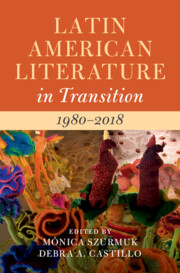Book contents
- Latin American Literature in Transition 1980–2018
- Latin American Literature in Transition
- Latin American Literature in Transition 1980–2018
- Copyright page
- Contents
- Contributors
- Acknowledgments
- Introduction
- Part I Security
- Part II New Genres
- Part III Mobilities
- Part IV Positionalities
- Chapter 17 Linguistic and Literary Tensions in Contemporary Paraguay
- Chapter 18 The Remaking of the “New Man” in Queer Cuban Cinema
- Chapter 19 Dissident Sexualities in Southern Cone Literature
- Chapter 20 Queer Feminist Hip Hop
- Chapter 21 Figures of the Impersonal in Contemporary Latin American Culture
- Part V Latin American Literature in Global Markets
- Index
- References
Chapter 19 - Dissident Sexualities in Southern Cone Literature
from Part IV - Positionalities
Published online by Cambridge University Press: 24 November 2022
- Latin American Literature in Transition 1980–2018
- Latin American Literature in Transition
- Latin American Literature in Transition 1980–2018
- Copyright page
- Contents
- Contributors
- Acknowledgments
- Introduction
- Part I Security
- Part II New Genres
- Part III Mobilities
- Part IV Positionalities
- Chapter 17 Linguistic and Literary Tensions in Contemporary Paraguay
- Chapter 18 The Remaking of the “New Man” in Queer Cuban Cinema
- Chapter 19 Dissident Sexualities in Southern Cone Literature
- Chapter 20 Queer Feminist Hip Hop
- Chapter 21 Figures of the Impersonal in Contemporary Latin American Culture
- Part V Latin American Literature in Global Markets
- Index
- References
Summary
Marked in many ways by uncertainty, the most interesting narratives of the early twenty-first century in Southern Latin America show signs of an irregular though constant rebelliousness, mostly embodied by women and transvestites. However, they also take into account the failures of the previous era and even suggest new representations for violence. Undoubtedly these narratives therefore outline series that connect on political levels that have remained apparently separated. These aesthetic experiences – that surface together with those feminist movements that have grown stronger in Latin America in the last years – contest genealogies, traditions, and families by inverting them or even creating new ones; by presenting other imaginations, unexpected bonds embodied by heterogeneous and thus dangerous contacts. Aware of time lapses, feminism interrupts any lineal narrative, and by reviewing the past, it recreates the political-aesthetic scenes and figures of the present, while gauging the measure of displacements and resistances. In this framework of political-aesthetic renewal that infuses the new century, we focus on certain literary scenes that bring out the fact that the textual and sexual archive of literary tradition and culture has been turned on its head. The expansion and problematization of literature from a female standpoint becomes an unprecedented cultural phenomenon that makes visible other forms of affects and bodies.
- Type
- Chapter
- Information
- Latin American Literature in Transition 1980–2018 , pp. 299 - 313Publisher: Cambridge University PressPrint publication year: 2022

